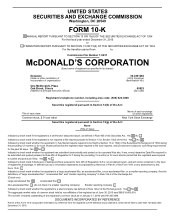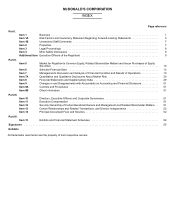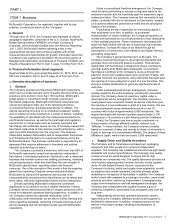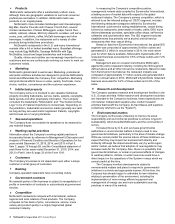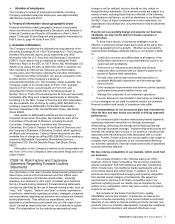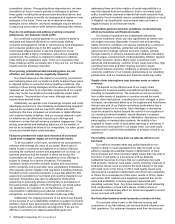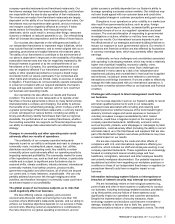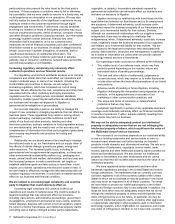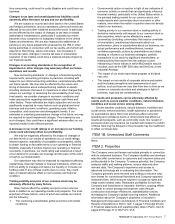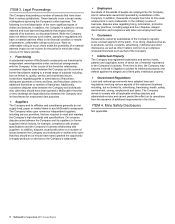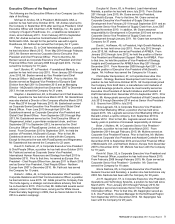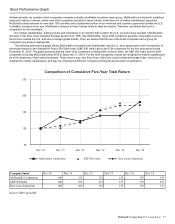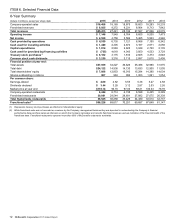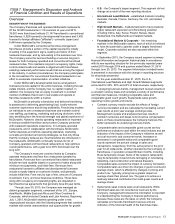McDonalds 2015 Annual Report Download - page 6
Download and view the complete annual report
Please find page 6 of the 2015 McDonalds annual report below. You can navigate through the pages in the report by either clicking on the pages listed below, or by using the keyword search tool below to find specific information within the annual report.4 McDonald's Corporation 2015 Annual Report
competitors’ actions. Recognizing these dependencies, we have
intensified our focus in recent periods on strategies to achieve
these goals, including the turnaround plan described above, and
we will likely continue to modify our strategies and implement new
strategies in the future. There can be no assurance these
strategies will be effective, and some strategies may be effective
at improving some metrics while adversely affecting other metrics.
If we do not anticipate and address evolving consumer
preferences, our business could suffer.
Our continued success depends on our System’s ability to
anticipate and respond effectively to continuously shifting
consumer demographics, trends in food sourcing, food preparation
and consumer preferences in the IEO segment. We must
continuously adapt to deliver a relevant experience for our
customers amidst a highly competitive, value-driven operating
environment. We continue to implement initiatives to address
these shifts at an aggressive pace. There is no assurance that
these initiatives will be successful and, if they are not, our financial
results could be adversely impacted.
If our pricing, promotional and marketing plans are not
effective, our results may be negatively impacted.
Our results depend on the impact of our pricing, promotional
and marketing plans and our System’s ability to adjust these plans
to respond quickly to economic and competitive conditions. Our
existing or future pricing strategies and the value proposition they
represent will continue to be important components of our overall
plan, may not be successful and could negatively impact sales
and margins. The promotion of our menu offerings may yield
results below desired levels.
Additionally, we operate in an increasingly complex and costly
advertising environment. Our marketing and advertising programs
may not be successful and we may fail to attract and retain
customers. We have increased our emphasis on digital offerings
and customer loyalty initiatives, and our success depends in part
on whether we can effectively execute such offerings and
initiatives in a way that will enhance customer engagement. If our
pricing, promotional and marketing plans are not successful, or
are not as successful as those of our competitors, our sales, guest
counts and market share could decrease.
Failure to preserve the value and relevance of our brand
could have a negative impact on our financial results.
To be successful in the future, we believe we must preserve,
enhance and leverage the value of our brand. Brand value is
based in part on consumer perceptions on a variety of factors,
including the nutritional content and preparation of our food, our
business practices and the manner in which we source the
commodities we use. Consumer acceptance of our offerings is
subject to change for a variety of reasons. For example,
nutritional, health and other scientific studies and conclusions,
which constantly evolve and often have contradictory implications,
drive popular opinion, litigation and regulation (including initiatives
intended to drive consumer behavior) in ways that affect the IEO
segment or perceptions of our brand and could be material to our
business. Perceptions may also be affected by third parties
presenting or promoting adverse commentary or perceptions of
the quick-service category of the IEO segment, our brand and/or
our operations, our suppliers or our franchisees. If we are
unsuccessful in addressing such adverse commentary or
perceptions, our brand and our financial results may suffer.
Additionally, the ongoing relevance of our brand may depend
on the success of our sustainability initiatives to support our brand
ambition of good food, good people and good neighbor, which will
require System-wide coordination and alignment. If we are not
effective in achieving our stated sustainability goals and
addressing these and other matters of social responsibility in a
way that inspires trust and confidence, trust in our brand could
suffer. In particular, business incidents that erode consumer trust,
particularly if such incidents receive considerable publicity or result
in litigation, can significantly reduce brand value and have a
negative impact on our financial results.
Unfavorable general economic conditions could adversely
affect our business and financial results.
Our results of operations are substantially affected by
economic conditions, which can vary significantly by market and
can impact consumer disposable income levels and spending
habits. Economic conditions can also be impacted by a variety of
factors including hostilities, epidemics and actions taken by
governments to manage national economic matters, whether
through austerity or stimulus measures and initiatives intended to
control wages, unemployment, credit availability, inflation, taxation
and other economic drivers. Many major economies, both
advanced and developing, continue to face weak economies, high
unemployment rates and other ongoing economic issues.
Continued adverse economic conditions or adverse changes in
economic conditions in our markets could pressure our operating
performance, and our business and financial results may suffer.
Supply chain interruptions may increase costs or reduce
revenues.
We depend on the effectiveness of our supply chain
management to assure reliable and sufficient product supply,
including on favorable terms. The products we sell are sourced
from a wide variety of suppliers in countries around the world.
Supply chain interruptions, including due to lack of supply or price
increases, can adversely affect us or the suppliers and franchisees
that are also part of our System and whose performance has a
significant impact on our results. Such shortages or disruptions
could be caused by factors beyond the control of our suppliers or
us, including inclement weather, natural disasters, increased
demand, problems in production or distribution, disruptions in third
party logistics or transportation systems, the inability of our
suppliers to obtain credit, or food safety warnings or advisories. If
we experience interruptions in our supply chain, our costs could
increase and it could limit the availability of products critical to our
operations.
Food safety concerns may have an adverse effect on our
business.
Our ability to increase sales and profits depends on our
System’s ability to meet expectations for safe food and on our
ability to manage the potential impact on McDonald’s of food-
borne illnesses and food or product safety issues that may arise in
the future. Food safety is a top priority, and we dedicate
substantial resources to ensure that our customers enjoy safe
food products. However, food safety events, including instances of
food-borne illness, have occurred in the food industry in the past,
and could occur in the future. In 2014, food quality issues were
discovered at a supplier to McDonald’s and other food companies
in China. As a consequence of this issue, results in China, Japan
and certain other markets were negatively impacted due to lost
sales and profitability, including expenses associated with
rebuilding customer trust. Any future instances of food tampering,
food contamination or food-borne illness, whether actual or
perceived, could adversely affect our brand and reputation as well
as our revenues and profits.
Our franchise business model presents a number of risks.
Our success relies in part on the financial success and
cooperation of our franchisees, yet we have limited influence over
their operations. Our restaurant margins arise from two sources:

